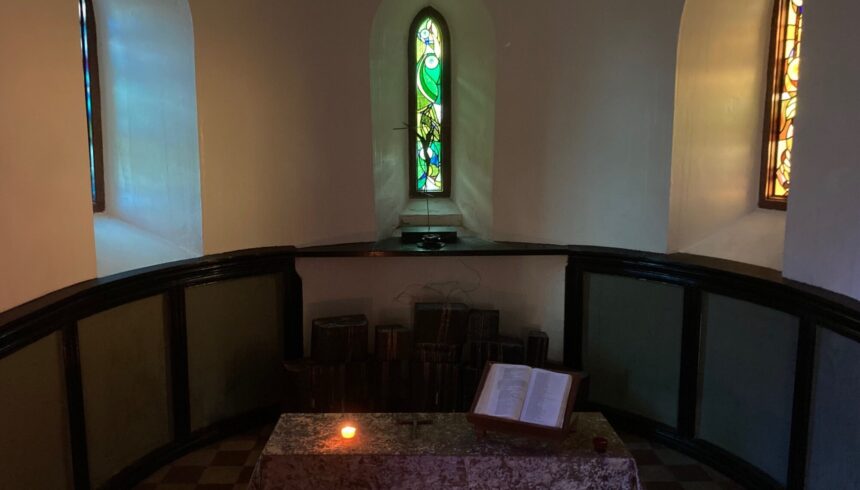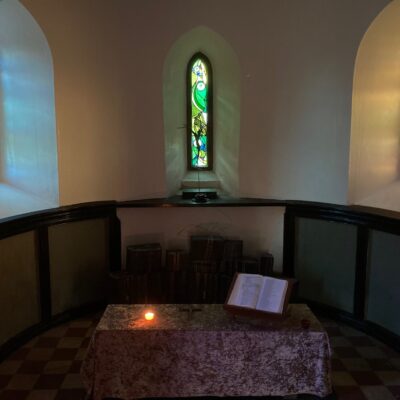I didn’t want to leave Syria, I didn’t want to be a refugee. But there was no other way to survive. I claimed asylum on arrival in the UK and I found myself in detention in Penally Camp in Wales. It was a massive site with Nissan hut-style dormitories, where new arrivals struggled to find the showers or dining room, or even the office of the sub-contractors – as it carried no signage.
Seeing the confusion of the newly arrived, I had to help them, simple things like how to get Wi-Fi, how to replenish their medicines, and simply answering people’s questions. There was so much need that it led me to think of devising a better system of communication, so I organised Whatsapp groups, each one of a certain number and each with leaders who would be responsible for their group and the groups in turn would help each other. We arranged these according to language groups and other criteria.
It soon became clear that people from the local community were interested in helping us, I found them on social media and joined various groups. So now we had a connection with the outside and they wanted to meet us. However, some far-right protesters were always at the gate, so we couldn’t meet there, but we could meet elsewhere locally. The supporters asked to be added to our Whatsapp network so they joined different groups and offered a lot of help. They helped us in many ways, with food, medicines and English classes.
The genesis of a Union
All of this was growing fast, so I eventually called my solicitor and asked him if, as an asylum seeker, I had a right to form an association. He wanted to know why and I explained that I wanted to campaign for better conditions and the improvement of the wellbeing of the people inside Penally camp
My solicitor said I needed a Constitution and signatories. I wrote the Constitution and emailed it to the welfare office inside the camp, asking them to print 10 copies, give me a pen and a stapler – I didn’t have anything, and they gave me all of this. Some of the residents signed, and I informed the welfare office that we had established an Association with a Constitution to help the residents. We were called “Camp Residents of Penally: CROP”.
We decided in our first meeting to prioritise English classes, some activities outside the camp and some art workshops. We asked the Office if we could have a teacher from outside to come and teach in the camp, this they refused. We therefore found the residents who had the best command of English and asked them to lead the classes, one was even an English teacher by profession. The office gave us some books and stationery and 53 people immediately signed up for the classes. We had three teachers so needed three rooms. We found rooms in the camp and asked the contractors to allow us to use them, they refused, but we insisted, and eventually they gave us the keys. We would be responsible for ourselves, so we kept a register and started the classes. People were so happy to be able to do this, it gave them a reason to get out of bed in the morning. Kind local volunteers gave us three laptops, English books and stationery.
Further initiatives
Sadly, there was a daily presence of protesters at the gate, which meant that people were not leaving the camp, which made it even more like a prison. One day, I met a journalist from the Tenby Observer and they offered us more support. They linked me with a local artist called Anna Waters, who wanted to help asylum seekers. Anna gave us both materials and workshops. This was announced on our Whatsapp groups and delivered over Zoom in the classrooms. The outcome for the men in Penally was excellent and the feedback from the artist was very good, she really felt the engagement of the men. It was great to have 3 English classes 5 days a week and 3 art workshops per week.
As CROP, we discussed how we could further help the men to get out of the camp and find them some voluntary work to do, as of course they are barred from working in the UK. The local community offered us volunteering opportunities in their shops and businesses. We could help on farms with milking cows and other tasks. The Charity shops in local towns offered us the opportunity to volunteer there, to which the camp’s management once again said ‘No’. After many meetings and negotiation we reached an agreement; I would give a list of 15 names the day before and these men were allowed to leave the camp early – up until then, we could not leave the camp before 11.00. The Public Law Project helped me to campaign to have access to the camp at any time of day, which we successfully achieved.
We also linked with City of Sanctuary, who offered us walks and days out, to do something fun, to get the men out of the camp. They rented a van or bus and took 15 people every time. Our first activity was a Pizza Night, after which we shared photos on the Whatsapp group which encouraged everyone to join in. We had to make a schedule because it was so successful. In general, we had volunteer or Sanctuary days 2-3 days a week, with a bus twice a day. This was very helpful to engage with local people and allow them to get to know the refugees. It really helped the asylum seekers to improve their mood and to have hope.
Buddy matching
Another initiative we promoted was to recommend people from within the camp to have a Buddy from outside. We knew this would be helpful for everyone, matching people from the wider local community in Wales. The Buddies were found by our supporters in the local Whatsapp groups and we matched up the people. We clarified that this would be a friend, a supporter, and the communication would be over Whatsapp. We managed expectations so that If they were to meet in person for a coffee, it was clear that this was not a date! The programme went very well for everyone concerned.
Continuity
Compared to others I received settled status very quickly and was able to work and get a job immediately. But I couldn’t forget my brothers who were held in Detention. We retained CROP in action with other responsible people inside the camp in charge of it. All the activities that we’d done had always been led by a member of CROP.
I continued to campaign on behalf of the refugees and I communicated with MPs, from the Labour Party and the Liberal Democrats. Also with the All Party Parliamentary Group for Detention and for Immigration[1]. I also worked with David Bolt, the Independent Chief Inspector of Borders and Immigration, which covered prisons and detention centres. We arranged Zoom meetings between him and the refugees and he visited Penally. He released the report which led to the eventual closure of Penally Camp.
We explored alternative ways to accommodate refugees instead of in military camps. We worked with ‘Refugees at Home’ charity and in fact I joined the scheme and was able to live with a family through that charity.
Penally camp closed in March 2021. We decided to continue the work of CROP which had been run and funded entirely by asylum seekers and had helped many people. We became a registered charity “Life Seekers Aid” in 2021 and have organised exhibitions in Wales and London to make the plight of asylum seekers known. We run community hubs and have been active in Napier Barracks and other centres since.
Napier Barracks remains open to this day. We still have plenty of work to do!
BBC report Asylum seeker’s fear over new sites after Penally stay – BBC News
[1] Inquiry into quasi-detention – full report – APPG on Immigration Detention (appgdetention.org.uk)



